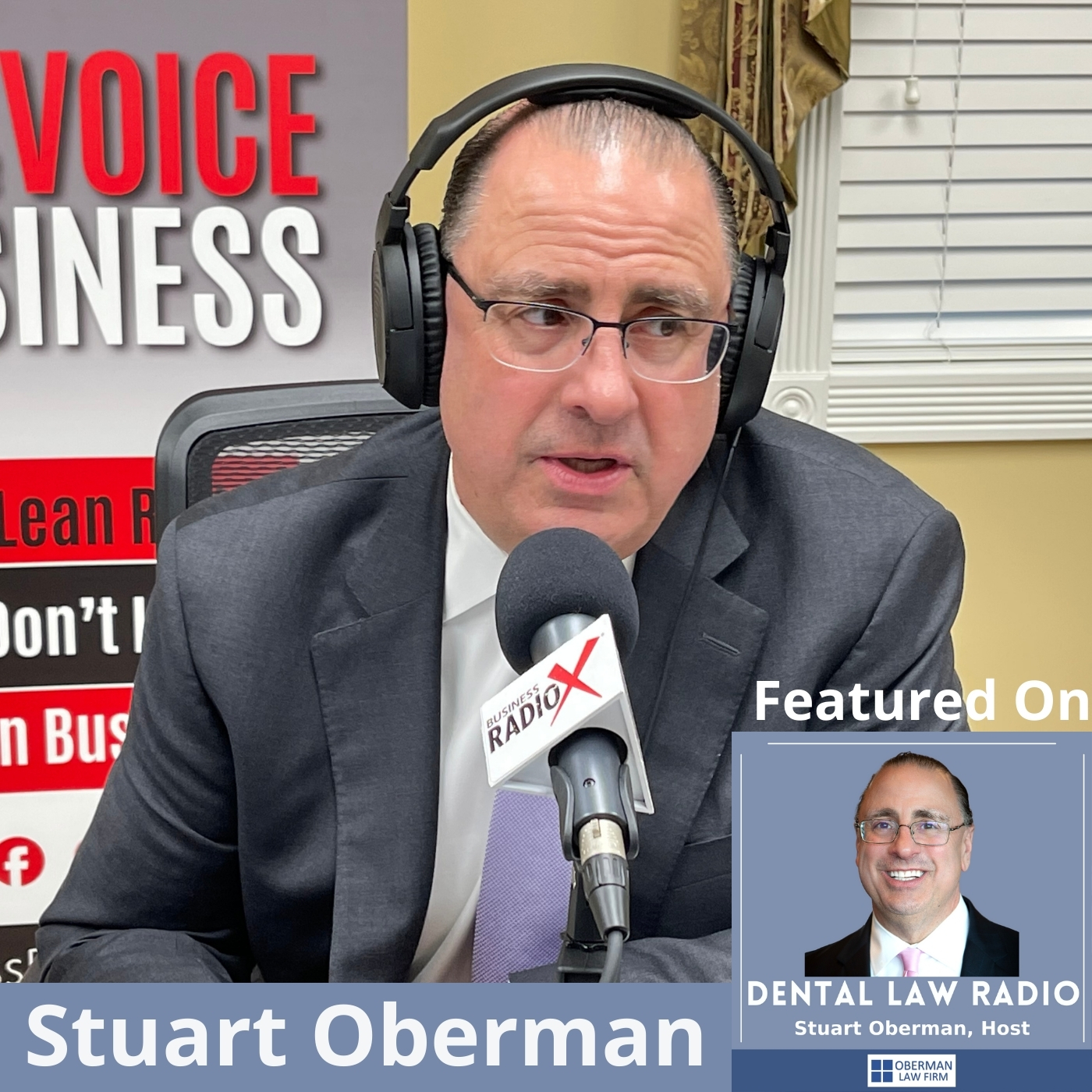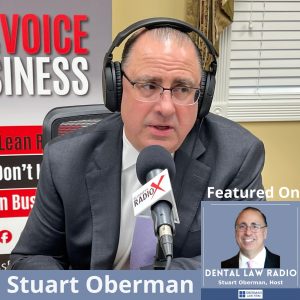

Must Have Covid-19 Policies for Employers (Dental Law Radio, Episode 17)
How should you handle Covid-19 policies for employees in your dental practice? Can you institute a mandatory vaccination policy? What accommodations can you (or should you) have? Whatever you decide, you’d best not be cutting and pasting what you find on a Google search in your employee handbook, as host Stuart Oberman explains in this episode. Dental Law Radio is underwritten and presented by Oberman Law Firm and produced by the North Fulton studio of Business RadioX®.
TRANSCRIPT
Intro: [00:00:01] Broadcasting from the Business RadioX studios in Atlanta, it’s time for Dental Law Radio. Dental Law Radio is brought to you by Oberman Law Firm, a leading dental-centric law firm serving dental clients on a local, regional and national basis. Now, here’s your host, Stuart Oberman.
Stuart Oberman: [00:00:26] Hello, everyone, and welcome to Dental Law Radio. The hot topic: Covid-19: What You Need to Know. I have a feeling that this is going to be going on, going for a while. Now, this is going to be sort of the second segment, if you will, of what we’ve done before, and we have probably two more segments to cover because, again, we can probably have this kind of segment speaking for eight hours on this topic.
Stuart Oberman: [00:00:59] So, last podcast, we covered COVID-19, Delta variant, mandates and legal liability. So, we covered the good, the bad, the ugly, and the mandates, the commendations, must-have policies. But now, we’re going to jump into and we’re going to drill down a little bit deeper on COVID-19 must-have policies. So, what does that mean? From a legal standpoint, I will tell you must have a policy mandatory or nonmandatory. You can’t just sort of trade defense on this. You’ve got to be all in either way. Either you’re going to mandate it and set guidelines. And then, policies and procedures, if it is not done, draw that line in the sand or you’re going to have nonmandatory policies, and then that’s a whole set of concerns.
Stuart Oberman: [00:01:59] So, what do we do? One, you’ve got to have a mandatory vaccination policy. Two, you got to have a non-mandatory vaccination policy. You got to have one or the other. If you have a mandatory policy for shots, if you will, you have to have a accommodation procedure. As we said in our previous podcast, there are some very, very stringent guidelines for mandatory matters. You have OSHA, you have CDC, you have EEOC, you have EEO, and then you have the FDA. So, on your mandated policies, you have to have a request for a medical exemption or an accommodation that is related to the vaccination. Then, you’ve got to have a request for religious exemption. And then, the accommodation related to the vaccination.
Stuart Oberman: [00:03:04] Now, I want to drill down specifically in policies. So, I want to outline things that have to be and should be in a policy. Now, I will urge you, do not go on the Internet, and cut and paste a vaccination policy because when you’re dealing with OSHA, CDC guidelines, EEOC, EEO and the FDA, that is an absolute trap that I will tell you will not be covered in the things you get on the Internet for cutting and pasting.
Stuart Oberman: [00:03:46] So, basically, basics, basics here, COVID-19 vaccination policy, what does that have to do? Okay. Purpose. You got to outline a purpose. That’s basic. You got to outline a scope. You have to have the policy which sets forth the deadline with which the employees have to have the policy or they have to do an exemption. Okay. So, those two things right there will dictate what forms you use, what forms you do not use.
Stuart Oberman: [00:04:23] So, now, I want to get into a little bit on the request for an exemption. Accommodation, if you will. Again, we’re back into — I know I keep stressing this, but any exemption that you have or receive has to be in guidance with OSHA, CDC, EEOC, EEO or FDA, because here’s why. So, what happens is the exemptions assist employees with disabilities who may be pregnant, who may be nursing, who actually have a qualified medical condition as to why they object to receiving the vaccination. And also, they have to outline that they have a sincerely held religious belief or practice.
Stuart Oberman: [00:05:14] Now, those are the requests for an exemptions. Okay. So, that’s an interactive process between you, the employee and HR. So, they have to show that one, it follows as an exemption; but two, the request has to show that it does not impose a undue hardship on the employer. And that has to be in writing in your document. And it also has to have or should have specific writing that the accommodation can be done and a request can be done without fear of retaliation. You retaliate against an employee who does not want to receive a vaccination, and you got all kind of federal law problems.
Stuart Oberman: [00:06:10] So, let’s take a little bit deeper dive into the request for a religious exemption or accommodation that’s related to the vaccination. So, first and foremost, you need to state very clearly that your practice, or for those who are not dental owners but maybe other business owners, that your business is committed to complying with all laws that protect employees’ religious beliefs. And that you will provide an exemption on a reasonable accommodation for employees’ religious beliefs and practices who prohibit the employee from receiving a COVID-19 vaccination. That is language that needs to be included, along with multiple sections of other exemptions.
Stuart Oberman: [00:07:12] Now, the language has the state — again, I would urge you to seek legal advice if you’re implementing these policies. Do not cut and paste. Now, the policy has to state that for religious exemption, you’re going to provide a reasonable accommodation – here’s the key – that does not create an undue hardship or pose a direct threat to the health or safety of others within the workplace, including the requested employee. So, those are just a small segment of things that have to be listed and outlined on the exemption accommodation.
Stuart Oberman: [00:07:59] So, now, we’ve got a whole another request. Okay. Request for a medical exemption or an accommodation related to COVID-19 vaccination. Again, key, key, key, key, your practice or business is committed to complying with all laws protecting individual rights with disabilities or medical conditions. And you, as employer, will provide an exemption for any medical condition or disability that prevents the employee from getting a COVID-19 vaccination.
Stuart Oberman: [00:08:43] Now, you can’t just go anywhere and get this. This is not like an excuse from your mom or dad, “I need to get out of school early.” This has to be a qualified medical exemption. So, you have to get, or should get, or mandated to receive written certification from a licensed treating physician or a DO – now, depending on your state, nurse practitioner or physician’s assistant, a PA. And there’s a specific outline, it must be noted in their medical report, if you will, as to why they should not receive the vaccination. Again, it has to be documented, meant medically that you are not entitled or required to receive the vaccination. That is a huge, huge burden to lift.
Stuart Oberman: [00:09:50] So, again, I’m going to refresh a little bit on a couple of things. So, mandated policies, okay, vaccination policies, it’s got to be in writing. You can’t just say, “Do this.” Nonmandatory vaccination policy, in writing. Not required. There’s whole steps for that that we’ll go into a little bit more detail. So, then if you have a mandated policy, you’ve got to have an accommodation request for either medical or religious reasons because you have to cover – it’s not optional – you’ve got to cover OSHA, CDC, EEOC, EEO and the FDA.
Stuart Oberman: [00:10:31] So, then, we just covered one of the basic things that have to be in an mandated policy. We covered specific things that have to be in the request for an exemption, for religious beliefs or for disabilities. So, again, I would urge you to seek counsel if you do not have these policies and procedures. And I will tell you, and I’ve said this before and I said this last year in 2000 when all this was taking place, if it’s not COVID-19, it’s going to be something else. We already got the Delta variant popping up that is creating a whole another set of issues. And there’s going to be something after COVID-19 because there always is. You got the swine flu. You got a million things that have happened. So, you got to get it in place now because, otherwise, you are asking for a recipe for disaster.
Stuart Oberman: [00:11:33] As a law firm, we’re going to be covering some areas in our newsletter, Constant Contact. If you have any questions or concerns, please feel free to email me directly, stuart@obermanlaw.com. You can certainly request that we schedule consults. You could certainly request that you be put on our newsletter. We’re trying to be out as a law firm out in front of this because we see where things are going. We have clients in Spokane, Washington, in Tampa, Florida, and up to Maine. So, we’ve got a pretty good idea where these things are going.
Stuart Oberman: [00:12:11] So, mandates, non-mandates, have a procedure in place. Folks, that is all for today. We’re going to go back, and we’re going to jump into two segments that are going to be following regarding COVID-19, because it is just that much of a serious issue that we need to address. Have a great day and thank you everyone for listening.
About Dental Law Radio
Hosted by Stuart Oberman, a nationally recognized authority in dental law, Dental Law Radio covers legal, business, and other operating issues and topics of vital concern to dentists and dental practice owners. The show is produced by the North Fulton studio of Business RadioX® and can be found on all the major podcast apps. The complete show archive is here.
Stuart Oberman, Oberman Law Firm

Stuart Oberman is the founder and President of Oberman Law Firm. Mr. Oberman graduated from Urbana University and received his law degree from John Marshall Law School. Mr. Oberman has been practicing law for over 25 years, and before going into private practice, Mr. Oberman was in-house counsel for a Fortune 500 Company. Mr. Oberman is widely regarded as the go-to attorney in the area of Dental Law, which includes DSO formation, corporate business structures, mergers and acquisitions, regulatory compliance, advertising regulations, HIPAA, Compliance, and employment law regulations that affect dental practices.
In addition, Mr. Oberman’s expertise in the health care industry includes advising clients in the complex regulatory landscape as it relates to telehealth and telemedicine, including compliance of corporate structures, third-party reimbursement, contract negotiations, technology, health care fraud and abuse law (Anti-Kickback Statute and the State Law), professional liability risk management, federal and state regulations.
As the long-term care industry evolves, Mr. Oberman has the knowledge and experience to guide clients in the long-term care sector with respect to corporate and regulatory matters, assisted living facilities, continuing care retirement communities (CCRCs). In addition, Mr. Oberman’s practice also focuses on health care facility acquisitions and other changes of ownership, as well as related licensure and Medicare/Medicaid certification matters, CCRC registrations, long-term care/skilled nursing facility management, operating agreements, assisted living licensure matters, and health care joint ventures.
In addition to his expertise in the health care industry, Mr. Oberman has a nationwide practice that focuses on all facets of contractual disputes, including corporate governance, fiduciary duty, trade secrets, unfair competition, covenants not to compete, trademark and copyright infringement, fraud, and deceptive trade practices, and other business-related matters. Mr. Oberman also represents clients throughout the United States in a wide range of practice areas, including mergers & acquisitions, partnership agreements, commercial real estate, entity formation, employment law, commercial leasing, intellectual property, and HIPAA/OSHA compliance.
Mr. Oberman is a national lecturer and has published articles in the U.S. and Canada.
Oberman Law Firm
Oberman Law Firm has a long history of civic service, noted national, regional, and local clients, and stands among the Southeast’s eminent and fast-growing full-service law firms. Oberman Law Firm’s areas of practice include Business Planning, Commercial & Technology Transactions, Corporate, Employment & Labor, Estate Planning, Health Care, Intellectual Property, Litigation, Privacy & Data Security, and Real Estate.
By meeting their client’s goals and becoming a trusted partner and advocate for our clients, their attorneys are recognized as legal go-getters who provide value-added service. Their attorneys understand that in a rapidly changing legal market, clients have new expectations, constantly evolving choices, and operate in an environment of heightened reputational and commercial risk.
Oberman Law Firm’s strength is its ability to solve complex legal problems by collaborating across borders and practice areas.
Connect with Oberman Law Firm:
Company website | LinkedIn | Twitter















